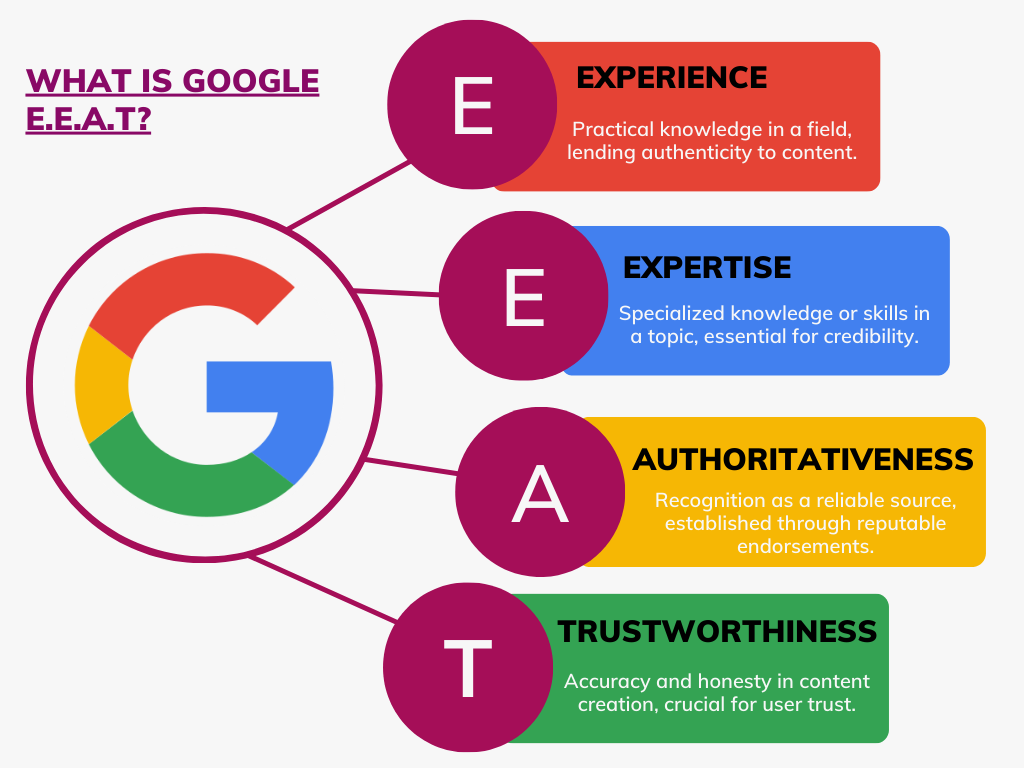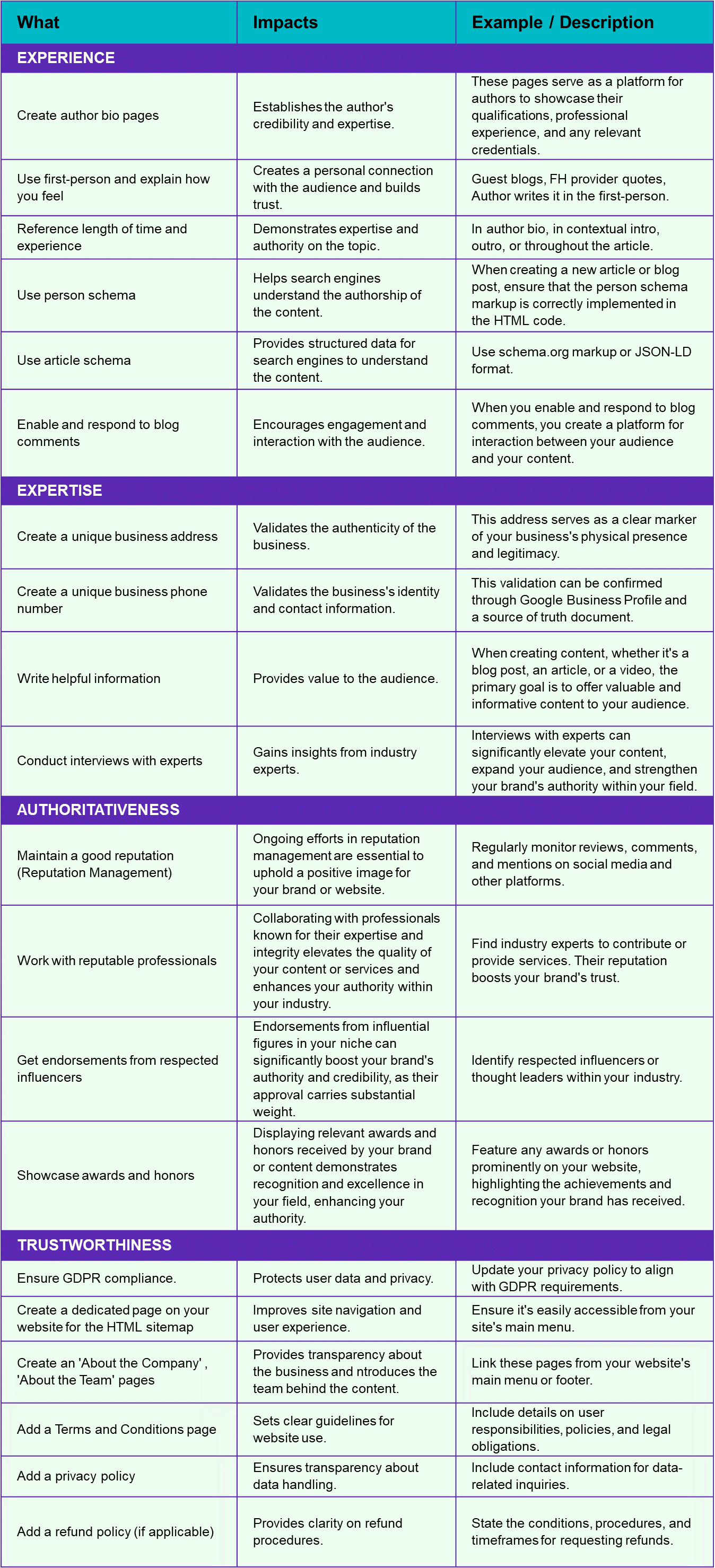How does your content stand out in the competitive world of SEO? What makes it reliable and rank-worthy in the eyes of Google? These questions lead us to the critical role of Experience, Expertise, Authoritativeness, and Trustworthiness aka E.E.A.T for key and competitive verticals. E-E-A-T, the upgrade of E.A.T specifically used for quality raters guidelines and the extra E (or double E) stands for –
“Does content also demonstrate that it was produced with some degree of experience, such as with actual use of a product, having actually visited a place, or communicating what a person experienced?”
and guides the assessment of web content’s quality and trustworthiness.
But why is SEO E-E-A-T more than just a fleeting trend? It’s a practical, results-driven approach that is integral for those committed to excelling in content creation and search engine optimization in the dynamic digital marketplace. This strategy is vital for staying ahead in an environment where the credibility and authority of your content can make or break its success.
What Is E-E-A-T and Why is it Important?
E-E-A-T, standing for Experience, Expertise, Authoritativeness, and Trustworthiness, is a critical framework in the world of SEO. This concept, central to E-E-A-T guidelines, plays a pivotal role in determining how content is ranked and valued by search engines. These components are not just metrics but are foundational to building a strong, credible online presence.
The importance of E-E-A-T lies in its ability to guide content creators in producing material that not only ranks well but also genuinely serves the needs and queries of users. By adhering to these principles, businesses, and individuals can enhance their digital content’s effectiveness and relevance.
Experience
‘Experience’ in the context of E-E-A-T refers to the practical knowledge or proficiency that a content creator or a brand brings to a subject or industry. In SEO E-E-A-T, demonstrating experience means showcasing a deep understanding and hands-on involvement in the field.
This could be through case studies, personal narratives, or demonstrable outcomes, which add a layer of authenticity and relatability to the content.
Expertise
‘Expertise’ is about having specialized knowledge or skill in a particular area. It’s a critical element in E-E-A-T guidelines, as search engines favor content created by individuals or entities that possess authoritative knowledge in their respective fields.
Many people are wondering how “Experience” differs from “Expertise.”
Short answer: one is everyday experience (i.e. being a cancer survivor), one is true expertise (being an oncologist)
Both can be valid for YMYL pages depending on context
p. 60 of the new QRG:#eeat #seo pic.twitter.com/LoINBKiRff
— Lily Ray ???? (@lilyraynyc) December 15, 2022
Demonstrating expertise can involve the use of well-researched data, certifications, qualifications, or a proven track record in the subject matter.
Authoritativeness
In the world of SEO E-E-A-T, ‘Authoritativeness‘ is about being recognized as a credible and reliable source of information. It involves establishing a reputation that makes others in the field reference your content as a definitive source.
Authoritativeness can be built through endorsements from reputable sources, publications in authoritative media, or contributions to well-regarded discussions in the field.
Demonstrating expertise can involve the use of well-researched data, certifications, qualifications, or a proven track record in the subject matter.
Authoritativeness can be built through endorsements from reputable sources, publications in authoritative media, or contributions to well-regarded discussions in the field.

Trustworthiness
Within the E-E-A-T framework, trustworthiness stands as a key pillar, encompassing the reliability and dependability of the content presented. This concept extends beyond just the information; it also applies to the credibility of the author, the core content of the page, and the overall website. While experience, expertise, and authoritativeness contribute to building trust, trustworthiness itself is a critical factor. It’s important to understand that without sufficient trustworthiness, a page’s E-E-A-T score may suffer, even if it excels in other areas.
The evaluation of trustworthiness hinges on various trust factors. For instance, the presence of credentials such as awards, testimonials, or endorsements on a page serves as a strong indicator of its trustworthiness. These elements collectively reinforce the credibility and reliability of the content, contributing significantly to its E-E-A-T evaluation.
E-E-A-T encourages authors to showcase their experience, expertise, and authority, particularly in sensitive fields like legal, financial, or medical matters. For instance, medical content should ideally be authored or overseen by those with relevant medical qualifications or expertise.
This focus on expertise and credibility brings us to another key Google concept: YMYL (Your Money Your Life).
YMYL: What Is It & How Does It Affect SEO?
YMYL, stands for “Your Money Your Life,” is a concept in SEO that identifies content with the potential to significantly impact a person’s health, happiness, safety, or financial stability. This concept is vital as it influences how search engines, particularly Google, assess and rank content. YMYL content demands high levels of accuracy and authority due to its potential impact on users’ lives.
The YMYL category encompasses various types of sites:
- Medical sites: These provide health information or advice and must maintain the highest standards of accuracy and reliability.
- Financial websites: Sites offering financial advice, tax information, or banking services must be exceptionally trustworthy and authoritative.
- Legal websites: Pages providing legal advice or information need to be precise and created by qualified professionals.
- Safety websites: Sites with advice on safety practices, disaster preparedness, or self-defense must be dependable and accurate.
- Online stores: E-commerce platforms, particularly those dealing with health, finance, or other YMYL products, are required to offer accurate product descriptions and secure transaction methods.
“Kind of make sure that that the site that you’re providing represents like a really high standard. And that the content is of really high quality and that it’s put together by people who understand what they’re doing. That’s not something like a run-out-of-a-garage kind of site. And that’s something that I think, especially for the medical area, is super critical.”
John Mueller, Google Search Advocate
In the context of YMYL, Google places a greater emphasis on E-E-A-T factors. This stringent approach ensures that low-quality or misleading content does not rank well in Google Search, especially when such content could significantly influence users’ lives. Understanding YMYL is essential for SEO strategies and content creation, ensuring that sensitive information adheres to the highest standards of quality and credibility.
The Significance of E-E-A-T in SEO
The concept of E-E-A-T (Experience, Expertise, Authoritativeness, and Trustworthiness) has become a linchpin in the sphere of SEO, significantly influencing how content is ranked and valued on the internet. Understanding the significance of E-E-A-T in SEO is vital for anyone aiming to optimize their online presence and achieve higher rankings in search engine results.
E-E-A-T, as a framework, goes beyond traditional SEO practices. It represents a shift towards valuing the quality and credibility of content as much as its relevance to specific keywords or phrases. This shift is a core part of Google E-E-A-T, where Google’s algorithms are increasingly focused on evaluating the content’s depth, accuracy, and usefulness to the user. Understanding what E-E-A-T is and its nuances becomes essential in this context.
The emphasis on E-E-A-T in SEO stems from a growing need for web content that is not only factually accurate but also trustworthy and reliable. Search engines, particularly Google, aim to provide users with search results that are not just relevant but also come from credible sources.
This is where the E-E-A-T criteria come into play. Content that demonstrates experience, expertise, authoritativeness, and trustworthiness is more likely to be viewed favorably by search engines.
E-E-A-T Guidelines for Content Creation
In the digital world where content is king, adhering to E-E-A-T guidelines is significant for creating content that not only ranks well in search engines but also genuinely serves and engages the audience.
Understanding and implementing these guidelines is key to succeeding in the competitive landscape of SEO.
Author Expertise: Establishing Authority in Your Content
One of the foremost aspects of E-E-A-T is showcasing author expertise. This involves demonstrating the author’s qualifications, experience, and knowledge in their field. In the context of Google E-E-A-T, this means creating content that reflects deep understanding and insight. When users recognize that the content is written by an expert, their trust in the information increases, and so does the content’s credibility in the eyes of search engines.
SEO E-E-A-T strategies should, therefore, include author bios, credentials, and real-world experiences that underscore the author’s expertise in the subject matter.
Building Trust: Strategies to Gain User Trust Through Content
Trust is a fundamental component of the E-E-A-T framework. To build trust through content, it’s essential to provide accurate, honest, and transparent information. This includes citing credible sources, presenting evidence for claims, and avoiding misleading or clickbait content.
In the sphere of SEO E-E-A-T, building trust also means ensuring website security, such as using HTTPS and having clear, accessible privacy policies and contact information. These elements reassure users and search engines alike about the trustworthiness of your content and website.
Ensuring Relevance: Aligning Content with User Intent and Expectations
The relevance of content is important in meeting E-E-A-T guidelines. It’s not just about creating content that incorporates keywords but about aligning the content with the actual intent and expectations of the user. Google E-E-A-T emphasizes content that addresses user queries effectively and provides valuable insights or solutions. This means understanding the audience, their needs, and how they search for information.
SEO E-E-A-T strategies should focus on creating content that is not only informative but also engaging and relevant to the audience’s interests and queries. By doing so, content creators can ensure that their material resonates with the audience and meets the stringent criteria of modern SEO.
Google E-E-A-T: Strategies for Implementation
In the field of SEO, understanding and implementing Google’s E-E-A-T guidelines is essential for ensuring your content is valued and ranked highly by search engines. These guidelines are fundamental in enhancing the quality and credibility of your online presence. Here are strategies to effectively implement E-E-A-T in your content creation process:

Image by Freepik
1. Create High-Quality Content
Creating high-quality content is at the heart of SEO E-E-A-T. This means producing material that is not only engaging and informative but also comprehensive and user-focused. High-quality content addresses user queries thoroughly, provides valuable insights, and is well-structured and easy to navigate. In line with Google E-E-A-T, such content should be well-researched, factually accurate, and presented in a way that enhances readability and user engagement.
The aim is to create content that users find useful and informative, which in turn signals to search engines the value and relevance of your website.
2. Use Credible Sources
Using credible sources is essential in establishing the authority and trustworthiness of your content. When discussing facts, statistics, or specific data, it’s important to cite reputable sources. This not only bolsters the credibility of your information in the eyes of your audience but also aligns with the E-E-A-T guidelines, which prioritize content backed by authoritative sources. For SEO E-E-A-T, referencing well-known industry experts, academic research, or official reports can significantly enhance the perceived expertise and trustworthiness of your content.
3. Create a Positive Brand Reputation
A positive brand reputation is integral to achieving and maintaining high E-E-A-T scores. This involves consistently producing quality content, engaging positively with your audience, and building a brand image that reflects reliability, professionalism, and expertise.
In the context of Google E-E-A-T, a strong brand reputation can lead to higher rankings and better visibility. Additionally, it’s beneficial to garner positive reviews, receive mentions from authoritative sites, and actively manage your online presence across various platforms.
4. Monitor and Leverage User-Generated Content
User-generated content (UGC), such as reviews, comments, and social media posts, can significantly impact your E-E-A-T. Encouraging and monitoring. It also presents opportunities to engage with your audience, address their concerns, and build a community around your brand.
Positive UGC can enhance your site’s trustworthiness and authoritativeness, as it reflects real user experiences and opinions.
Measuring E-E-A-T Success
To effectively gauge the impact of your E-E-A-T strategies, it’s essential to measure their success using specific metrics and ongoing analysis. Understanding how to measure the success of your Google E-E-A-T efforts can guide you in optimizing your SEO strategies and content creation to achieve better results.
Key Performance Indicators (KPIs)
Key Performance Indicators are vital in assessing the effectiveness of your E-E-A-T implementation. Common KPIs include organic search traffic, keyword rankings, click-through rates (CTRs), user engagement metrics (like time on page and bounce rate), and conversion rates. These indicators can provide insights into how well your content aligns with the E-E-A-T guidelines.
For instance, an increase in organic traffic and improved keyword rankings can indicate that your content is being viewed as more relevant and authoritative by search engines, in line with SEO E-E-A-T principles. Monitoring changes in these KPIs can help you understand the effectiveness of your E-E-A-T-focused content and SEO strategies.
Monitoring and Adjusting Strategies
Continuous monitoring is vital for the success of Google E-E-A-T strategies. This involves regularly reviewing your content’s performance against your KPIs and staying updated with the latest E-E-A-T guidelines and SEO best practices.

Image by Freepik
Analyzing user feedback, such as comments and reviews, can also provide valuable insights into the trustworthiness and user perception of your content. Based on these insights, it’s important to adjust your strategies accordingly. This could mean updating or enhancing existing content, modifying your approach to content creation, or reevaluating the sources used in your articles. Regular adjustments ensure that your content remains relevant, authoritative, and trustworthy, adhering to the evolving standards of what is E-E-A-T in the dynamic landscape of SEO.
Conclusion
The essence of SEO E-E-A-T lies in leveraging Experience, Expertise, Authoritativeness, and Trustworthiness to elevate your SEO strategy. Embracing these E-E-A-T elements is essential for producing content that not only ranks well but also earns the trust and engagement of your audience. This method transcends conventional SEO techniques, focusing on establishing a trustworthy and authoritative presence online. In the ever-evolving digital landscape, committing to the E-E-A-T framework is indispensable for creating impactful, quality content that stands out and sustains success in the competitive world of online content creation and search engine optimization.
Here is a basic checklist of items for your website to be more and better set for E-E-A-T.
